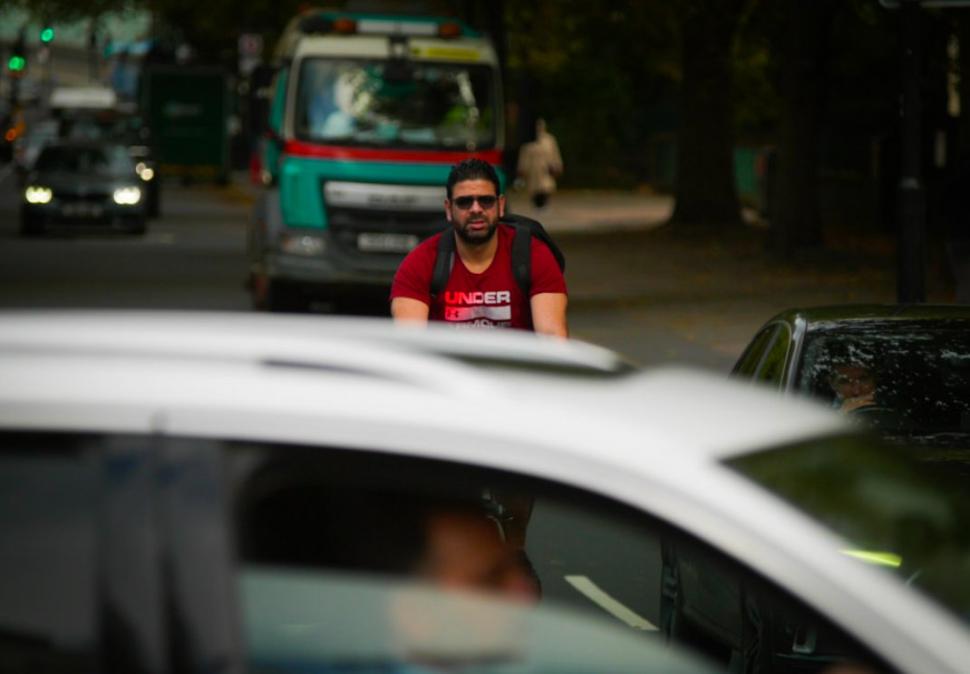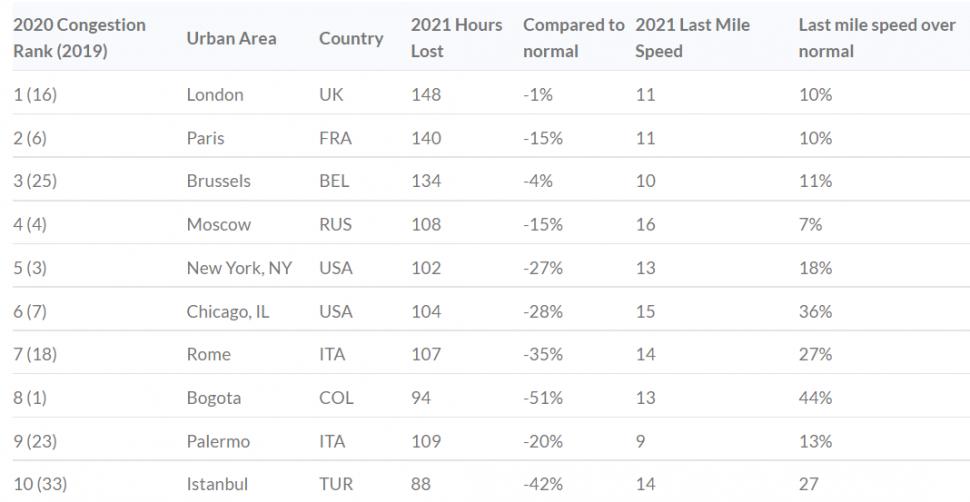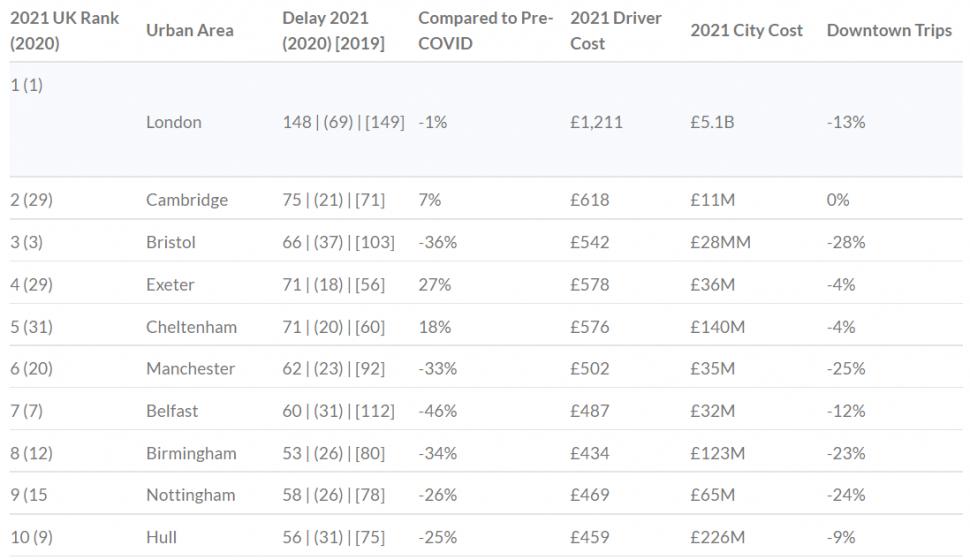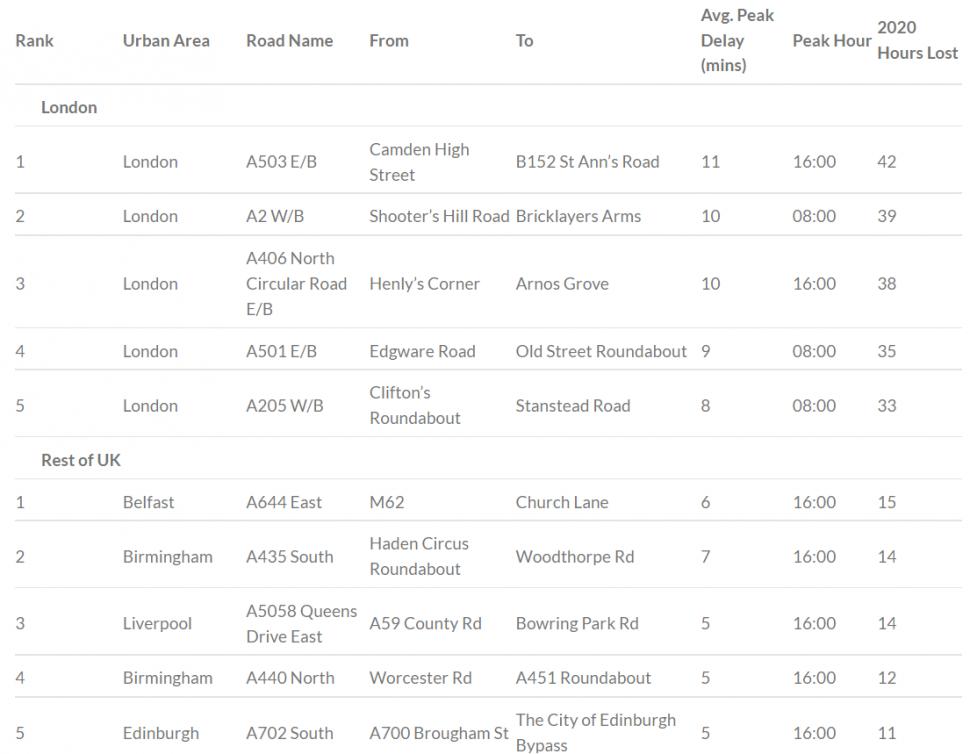- News
- Reviews
- Bikes
- Accessories
- Accessories - misc
- Computer mounts
- Bags
- Bar ends
- Bike bags & cases
- Bottle cages
- Bottles
- Cameras
- Car racks
- Child seats
- Computers
- Glasses
- GPS units
- Helmets
- Lights - front
- Lights - rear
- Lights - sets
- Locks
- Mirrors
- Mudguards
- Racks
- Pumps & CO2 inflators
- Puncture kits
- Reflectives
- Smart watches
- Stands and racks
- Trailers
- Clothing
- Components
- Bar tape & grips
- Bottom brackets
- Brake & gear cables
- Brake & STI levers
- Brake pads & spares
- Brakes
- Cassettes & freewheels
- Chains
- Chainsets & chainrings
- Derailleurs - front
- Derailleurs - rear
- Forks
- Gear levers & shifters
- Groupsets
- Handlebars & extensions
- Headsets
- Hubs
- Inner tubes
- Pedals
- Quick releases & skewers
- Saddles
- Seatposts
- Stems
- Wheels
- Tyres
- Health, fitness and nutrition
- Tools and workshop
- Miscellaneous
- Tubeless valves
- Buyers Guides
- Features
- Forum
- Recommends
- Podcast
news
 Cyclist in traffic (copyright Simon MacMichael)
Cyclist in traffic (copyright Simon MacMichael)“Incredibly simplistic” to blame cycle lanes for London being named world’s most congested city
London has today been named the world’s most congested city and, according to much of the media, cycle lanes are to blame – something the charity Cycling UK describes as an “incredibly simplistic” conclusion.
The 2021 Global Traffic Scorecard from traffic data specialists Inrix sees London jump from sixth to first place as the city in which motorists lost the most time stuck in traffic jams last year, replacing Colombia’s capital, Bogota, in the top spot.
Drivers in London lost 148 hours in traffic jams last year, down just 1 per cent from pre-COVID levels. In second place was Paris – a city where authorities have been far more proactive in putting emergency bike lanes in place and restricting motor traffic than the British capital has – on 140 hours, a 25 hour improvement. And in both cases, average last-mile motor vehicle speed actually improved by 10 per cent.
Here are the global top 10 most congested cities in 2020, according to the Inrix Global Traffic Scorecard.
A number of news outlets in the UK have seized upon a comment by Inrix operations director Peter Lees that cycle lanes installed in response to the COVID-19 crisis have brought about a “negative impact on congestion”.
He said: “Use of roads is all about supply and demand. If the demand goes up but the road space is being shared with other forms of transport, there’s less tarmac effectively for the cars to be on, which then has an impact on the speeds on the road and therefore congestion.”
The London Evening Standard covered the survey under the headline Cycle lanes blamed as London becomes world’s most congested city, while BBC News went with London congestion: Cycle lanes blamed as city named most congested. A number of other outlets have run with similar headlines.
However, Lees himself said that the principal reason for London taking the top spot was simply that it had recovered from the pandemic more quickly than other cities around the world (although that ignores other factors such as decreased use of public transport with many switching to cars, and a boom in van deliveries).
“One might argue it’s a good thing that the congestion is there because it’s showing that the economic recovery has been particularly quick, but the downside to that means congestion has returned,” he explained.
In fact, of the five most congested traffic corridors named in the capital by the Inrix survey, only one has seen any significant cycling infrastructure put in during the pandemic – the A501 eastbound from Edgware Road to Old Street Roundabout, and even then, only for the Euston Road section of the route.
That infrastructure was put in place under Mayor Sadiq Khan’s Streetspace for London programme, with the other high-profile temporary cycle lane in the centre of the capital, on Park Lane, not making the top five – nor indeed did Chiswick High Road, home to Cycleway 9 opened in December last year and which has faced bitter opposition from a vocal minority.
That mirrors road.cc analysis of findings in previous Inrix reports – pre-pandemic, for example, no road on which major cycling infrastructure had been built featured among the most congested in London in 2018.
And a report published earlier this year by Imperial College London found that “special London cycle lanes, which aim to boost commuting by bicycle, do not negatively impact traffic speed.”
Indeed, researchers found that while Cycle Superhighways “somewhat reduced traffic flow – the number of vehicles passing by in a certain time frame – they improved traffic speed, meaning overall there was little impact on congestion.”
Lead author of the study Dr Prajamitra Bhuyan of the Department of Mathematics at Imperial, said: “Estimating the effect of the cycle superhighways on congestion has been difficult, as there are many factors at play and the highways themselves were not planned randomly – they have been placed in areas plagued with congestion.
“Our method provides evidence that Cycle Superhighways can be an effective intervention in metropolitan cities like London, which are heavily affected by congestion. We hope the method can also assist in effective decision making to improve the performance of the traffic and cycling network in cities.”
Here’s what London Walking & Cycling Commissioner Will Norman had to say about the report published today.
Let’s be absolutely clear – decades of credible research shows that cycling & public transport are key to reducing traffic & pollution in cities. That’s why we’re continuing to invest in a high quality cycle network, enabling millions of green & clean journeys around the capital.
— Will Norman (@willnorman) December 7, 2021
Duncan Dollimore of the charity Cycling UK said: “It’s incredibly simplistic for Inrix to suggest that the use of road is all about supply and demand, without considering how efficiently that road space is used.
“On Blackfriars Bridge, cycle lanes take up 20 per cent of the road space but move 70 per cent of the people across it at peak times, with cycle lanes across London moving more people more efficiently in less space.”
Data from DfT shows that people on bikes outnumbered car drivers on Blackfriars Bridge (Central London) last year.
In 2000 the average daily flow was 50,000 cars and 1,125 bikes. In 2020 it was 8900 bikes, and 8800 cars and taxis.
A protected cycleway was installed in 2016. pic.twitter.com/yO3PDCaRGH
— APPGCW (@allpartycycling) December 3, 2021
He continued: “Inrix are focused on the tarmac available for cars, when the question should be how we use and allocate that space better, changing travel behaviours and reducing congestion in the process.
“Car dependency locks in congestion,” he added. “By building more cycle lanes, London is rebalancing their roads, offering a safe, healthy and space efficient alternative.”
Here are the top 10 most congested towns and cities in the UK 2020, according to the Inrix Global Traffic Scorecard.
And here are the most congested road traffic corridors in London and in the rest of the UK.
Simon joined road.cc as news editor in 2009 and is now the site’s community editor, acting as a link between the team producing the content and our readers. A law and languages graduate, published translator and former retail analyst, he has reported on issues as diverse as cycling-related court cases, anti-doping investigations, the latest developments in the bike industry and the sport’s biggest races. Now back in London full-time after 15 years living in Oxford and Cambridge, he loves cycling along the Thames but misses having his former riding buddy, Elodie the miniature schnauzer, in the basket in front of him.
Latest Comments
- johnsonmoog 51 min 56 sec ago
So, if Jamie needs 1000mg of sodium an hour, how many hydration tabs or elctrolyte mix does he need. I see SIS a hydration tab provides 798mg of...
- S.E. 1 hour 2 min ago
My guess is that they sell mainly on the German market - feel free to correct me. That might explain why they are not "pushing" their products,...
- ktache 1 hour 27 min ago
Now Emily Chappell really liked the Lezyne , I have the HV version, good, but I find the handle uncomfortable in use. I've often wondered about the...
- biking59boomer 34 min 52 sec ago
What about this one!? Taken in Cardiff Civic Centre 1939
- Muddy Ford 1 hour 37 min ago
Charlie Alliston got 18mths and is the reference case (because there are so few cases) for all campaigns by anti-cyclists that 'cyclists are not...
- belugabob 2 hours 39 min ago
My local football practice pitches (all weather, in a fenced off area, are regularly the scene of inconsiderate parking, with vehicles blocking the...
- chrisonabike 2 hours 56 min ago
Don't forget though "Englishman's home is his castle" - which includes my rights to grow a giant curtain wall of Leylandii to "protect my privacy"....
- Spangly Shiny 3 hours 4 min ago
Assos ASOS anyone?
- chrisonabike 3 hours 18 min ago
Replace them all with Bromptons and they'd take up zero space within days or even hours, as they are all relocated elsewhere. To eBay or possibly...
- Andrewbanshee 3 hours 49 min ago
Where I live we are experiencing a lot of housing development on small and large plots of land. These developers don't seem to have problems...



Add new comment
42 comments
But then you'll be crashing into Coronation Street time (apparently) - and then what?
I thought the accepted term was a "collision"?
Radio advertising in the car?
How can they listen to the radio at the same time as watching Netflix?
Easy. Radio on the infotainment system. Netflix on the phone with subtitles.
That is literally how road schemes are justified. An unrealistic financial value is placed on reducing travel time by car, then multiplied by all the cars that might use it for the next fifty years. The value for bus, train, bike and walking is less, and they pretty well ignore the environmental effects of new road schemes.
I've lost count of how many times that this deliberately biased system has been going to be reformed, but I'd guess it's double figures.
but there are also costs
delivery drivers - more drivers (and vans) needed for the same number of deliveriies because of congestion.
more time to drive a bus route - more buses and drivers
anyone who is driving for work (as opposed to driving to work, is losing productive time)
Where did I say there were no costs or the costs were not relevant ?
Also from the Inrix Scorecard
Hours lost to congestion (motor vehicles)
London - 148
Amsterdam - 7
Copenhagen - 48
Utrecht - 19
Freiburg - 40
It would be interesting to get Inrix's view on the correlation between cycling infrastructure and congestion in these other cities.
Presumably there are no cycle lanes in Belfast. Congestion down 46%
That's cause they're all stuck on the Westlink/M2/Sydenham ByPass triangle and going nowhere.
A company part-owned by Porsche (no less) blames cycle lanes for causing congestion? Surprise surprise...
No chance that the number & size of cars & other motor vehicles is contributing to this? No thought not.
Don't want to be 'stuck in traffic?' - Get on a bike.
Pages